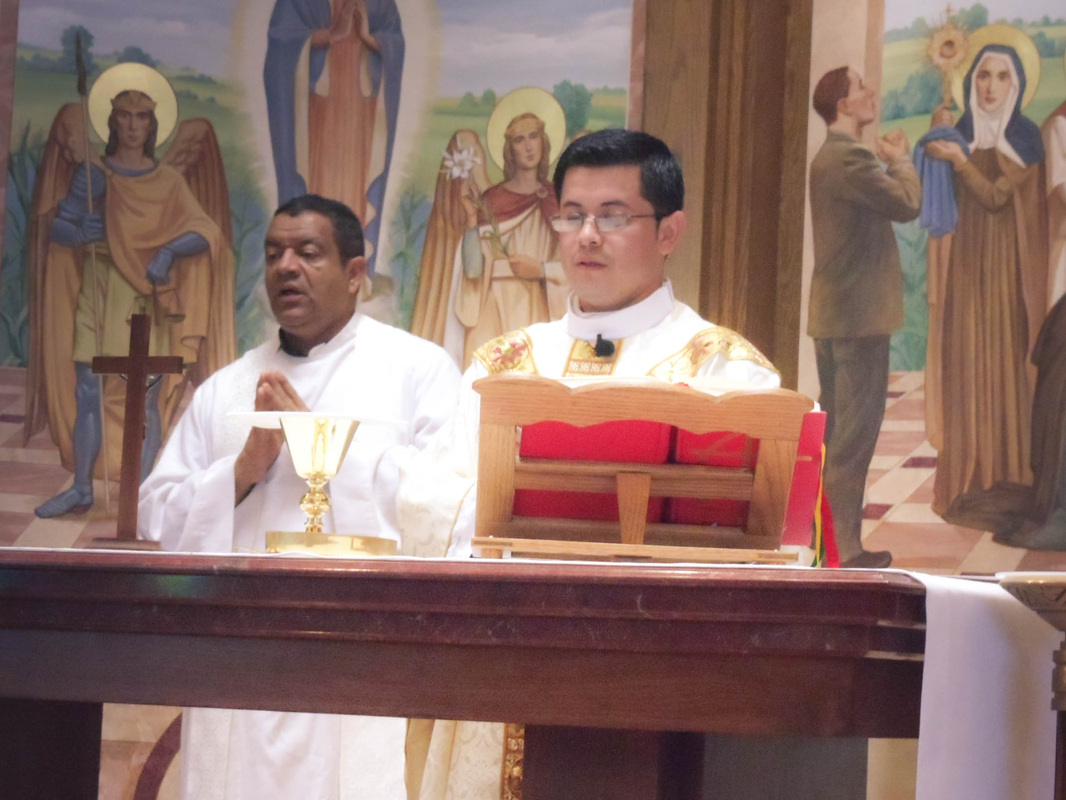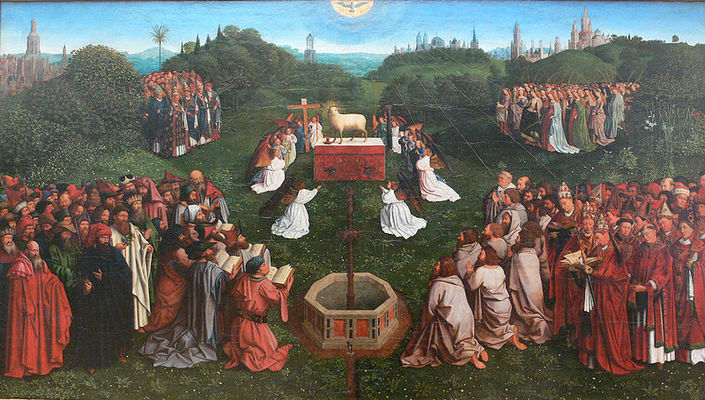 Confidence in time of uncertainty Brothers and sisters, We are familiar with the story of Abraham in the book of Genesis in which God asked him to sacrifice his only son. It is understood that it was an offering of his son’s life. It was a sacrifice which would cost the life Abraham’s son, Isaac. Why did God ask Abraham for his son’s life? Did God truly want Abraham to take the life his son, Isaac? Of course not. God would never ask for something of that nature. It was a test in order to prove Abraham’s fidelity to God. Abraham, despite the sadness caused by the request, set off for the place indicated by God along with his son and two of his servants. The book of Genesis narrates that God instead sent a lamb for the sacrifice and Abraham did not have to take the life of his son. God now knew that He could fully trust in Abraham. God knew that this righteous man would not keep anything for himself and whatever God asked of him, he would do it. This story, dramatic as it sounds at the beginning and as beautifully as it ends, teaches us to trust in God in times of uncertainty. This gift of trust precisely asks us to act in faith when we do not know the outcome. This gift makes me think of the vocation to the priesthood to which I am called. When I began my priestly formation in January 2001, I did not have an idea of what would happen with my life. Despite the uncertainty, I said to myself, “if God is calling me, everything will be all-right.” My words here are dedicated to the young men and women who are potentially being called to the vocation of priesthood or consecrated life. You know the challenges and obstacles that priests go through. You know of our work in the parish. You also listen to what people or media say about priests. Sometimes this vocation seems to be very demanding. You might think that you do not have the skills for this ministry and so you are afraid to say yes to God. What I want you to know, nonetheless, is that if God is calling you to that unique vocation, everything will be okay if you have confidence in Him. God will give you all the necessary tools so that you will be able to carry out that ministry. God will place all the right people in your path when you ask for help. And God will not bless only you; through your ministry, He will shower blessings upon those whom you serve as well. Finally, fear is not an option in the priesthood or consecrated life. There is only room for confidence in God. There are challenges and obstacles along the way, but there will be a happy ending. God bless you. Confianza en momentos inciertos
Hermanos y hermanas: Estamos familiarizados con la historia de Abraham, en el libro del Génesis, en la cual Dios le pide que ofrezca su único hijo a Él. Claro, se entiende que era un ofrecimiento de su vida, un sacrificio que le iba a costar la vida a Isaac. ¿Por qué Dios pide algo así? ¿Verdaderamente quería Dios la muerte del único hijo de Abraham? Claro que no, Dios no iba a pedir algo así, era una prueba para comprobar la fidelidad de Abraham. Abraham, a pesar de la tristeza, se encamina hacia el lugar que Dios le había indicado junto con su hijo Isaac y dos de sus siervos. Como el libro del Génesis lo narra, Dios provee el cordero para el sacrificio y Abraham no tiene que sacrificar a su hijo. Sin embargo, Dios sabe que puede confiar totalmente en Abraham. Dios sabe que este hombre no se va a guardar nada para él y que lo que Dios le pida lo va a hacer. Esta historia, dramática como es en su comienzo pero, hermosa en su final, nos enseña a tener confianza en Dios en los momentos de incertidumbre. El don de la confianza precisamente nos pide hacer un acto de fe cuando no sabemos lo que va a suceder. El don de la confianza me hace pensar en la vocación sacerdotal a la cual fui llamado. Cuando comencé mi formación sacerdotal en enero de 2001 no tenía idea de lo que iba a suceder con mi vida. Yo me decía a sí mismo, si Dios me está llamando todo estará bien. Mis palabras están dedicadas especialmente para los jóvenes y las jóvenes que son potencialmente llamados a la vida sacerdotal o consagrada. Ustedes conocen los desafíos y obstáculos por los que pasamos los sacerdotes. Ustedes conocen nuestro trabajo en las parroquias. Ustedes escuchan lo que dicen los medios a cerca de los sacerdotes. Seguramente por lo que ves y escuchas decides no dar ese sí a Dios. Lo que quiero que sepas es que si Dios te llama y tú tienes confianza en Él, todo va estar bien. Dios te dará todas las herramientas necesarias para llevar a cabo esa misión como religiosos. Dios va a colocar en tu camino a las personas indicadas para que te ayuden en esos momentos en los cuales tú pides ayuda. Dios no solamente te va a bendecir a ti. Tu ministerio a la vez será una lluvia de bendiciones para todas las personas a las cuales vas a servir como sacerdote, religioso o como religiosa. El miedo no es una opción en la vida sacerdotal o consagrada, la esperanza en Dios sí lo es. En el camino hay desafíos y pruebas pero el final será feliz. Dios los bendiga.
0 Comments
Dear brothers and sisters in Christ, We have already begun our Lenten pilgrimage. The Church gives us forty days of Lent so that we may increase our time of prayer, are more vigilant with our acts of charity, and are generous with our offerings to God’s Church. I would like to call your attention on a theme which is very frequent during this time of Lent. It is the forty days emphasized by scripture as a time for spiritual renewal. In the Old Testament we read, “For forty days and forty nights heavy rain poured down on the earth” (Gen 7:12) with reference to the great flood. “But Moses passed into the midst of the cloud as he went up on the mountain; and there he stayed for forty days and forty nights” (Ex 24:18), regarding God’s covenant with Israel. In the New Testament we also read of, Jesus’ temptations in the desert: “Filled with the Holy Spirit, Jesus returned from the Jordan and was led by the Spirit into the desert for forty days, to be tempted by the devil. He ate nothing during those days, and when they were over he was hungry” (LK 4:1-2). The symbols of night and day make us think of darkness and light. Lent is precisely that- a pilgrimage, a transitional moment in our spiritual lives. God invites us, during these forty days of Lent, to pass from darkness to light, from sin to grace, from unmoral habits to the practice of virtue. Do not let the liturgical Season of Lent go by like any other day without making a difference in your spiritual life. Open your life to God’s grace and allow the Holy Spirit to guide your Lenten pilgrimage. God Bless you. Queridos hermanos y hermanas en Cristo:
Ya empezamos nuestro peregrinar cuaresmal. La Iglesia nos da cuarenta días para que podamos incrementar nuestro tiempo de oración, estar más vigilantes con nuestros actos de caridad y ser generosos con nuestras ofrendas a la iglesia de Dios. Me gustaría llamar su atención con un tema que es muy frecuente durante este tiempo: se trata de los cuarenta días que destaca la Escritura como un tiempo de renovación espiritual. En el Antiguo Testamento leemos, “Y una fuerte lluvia cayó sobre la tierra durante cuarenta días y cuarenta noches” (Génesis 7:12) con referencia al gran diluvio. “Y entró Moisés en medio de la nube, y subió al monte; y estuvo Moisés en el monte cuarenta días y cuarenta noches” (Éxodo 24:18) de acuerdo al convenio de Dios con Israel. En el Nuevo Testamento también leemos de las tentaciones de Jesús en el desierto: “Jesús, lleno del Espíritu Santo, volvió del Jordán, y fue llevado por el Espíritu al desierto, por cuarenta días, y era tentado por el diablo. Y no comió nada en aquellos días, pasados los cuales, tuvo hambre” (Lucas 4:1,2). Los símbolos de la noche y el día nos hacen pensar en la oscuridad y la luz. La Cuaresma es precisamente ese peregrinaje, un momento de transición en nuestra vida espiritual. Dios nos invita durante estos cuarenta días, a pasar de la oscuridad a la luz; del pecado a la gracia; de los malos hábitos a la práctica de la virtud. No dejes que el tiempo litúrgico de la Cuaresma pase como otro día mas sin hacer una diferencia en tu vida espiritual. Abre tu vida a la gracia de Dios y permite que el Espíritu Santo guíe tu peregrinación cuaresmal. ¡Dios te bendiga! 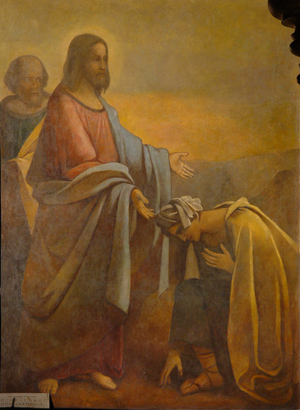 Dear parishioners, This weekend we are celebrating the sixth and last Sunday of Ordinary Time before we enter into the liturgical season of Lent. We have been meditating on the Gospel of Mark; the passage for today tells us about one more miracle of healing, Jesus heals a leper. So that we do not lose interest in Sacred Scriptures and to find it always intriguing, it is good to ask questions after reading it. For instance, where was Jesus when He healed the man suffering from leprosy? Why did Jesus cure him? Why did Jesus ask this man to be silent about His healing miracle? Why did the leper do the opposite? If we look back a few verses, we read that Jesus leaves the town of Capernaum and travels around the nearby villages to preach the gospel. It seems that Jesus was not necessarily in a town but on the border. We already know the leper's situation because of what we read in the first reading from Leviticus; since the time of Moses and Aaron, the lepers were isolated from the community, their garments rendered, their heads bare, and they must cry out, “unclean, unclean”. The leper in today’s Gospel reading had reached the point of despair. He had lost all hope. In this condition, periphery and disease, he found Jesus. Of course he had heard about Jesus and of the miracles He performed. This man turned to Jesus as his last hope. This situation made the leper fully trust in Jesus; kneeling, he begged, ‘if You want, You can heal me.’ Jesus, with His healing power, not only restored health to this man isolated by leprosy, more importantly, Jesus returned his dignity- this dignity that had been taken by the misfortune of a disease and the isolation of a social code. Brothers and sisters, surely we are far from reaching the point of despair of the leper. Hope that we never arrive at that point. However, comfort and human security can be lost when one becomes distant with God. This distance comes from a decrease of our faith in Him. It seems that we build certain tolerance to sin in our life. We think that, in theory, sin does not affect us as much as other people. The reality is that sin destroys our dignity and creates more distance from God. Clearly the social codes which help us to form our morals no longer have the same effect. But Jesus, dear brothers and sisters, can and wants to restore our dignity. God is the merciful Father who has His arms wide open to embrace you in the Sacrament of Confession. Do not wait any longer to restore your dignity as a child of God. May God bless you. |
Rev. Johnson LopezFather Lopez is Pastor of Saint Patrick Catholic Church in Rochelle, IL. Categories
All
Archives
April 2017
|
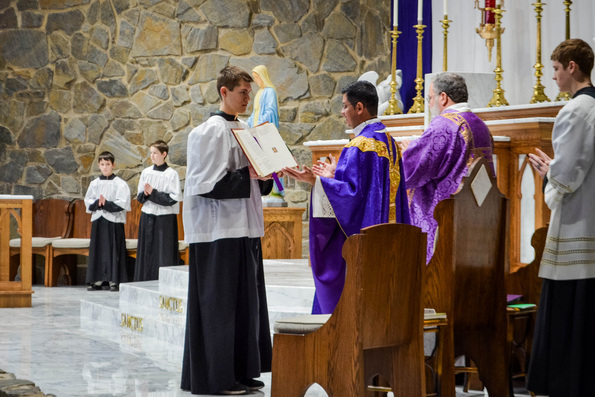
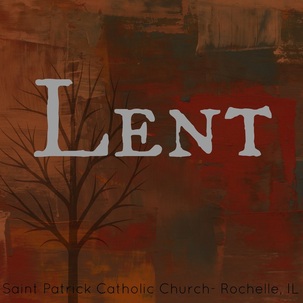
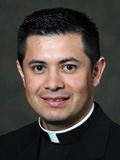
 RSS Feed
RSS Feed
